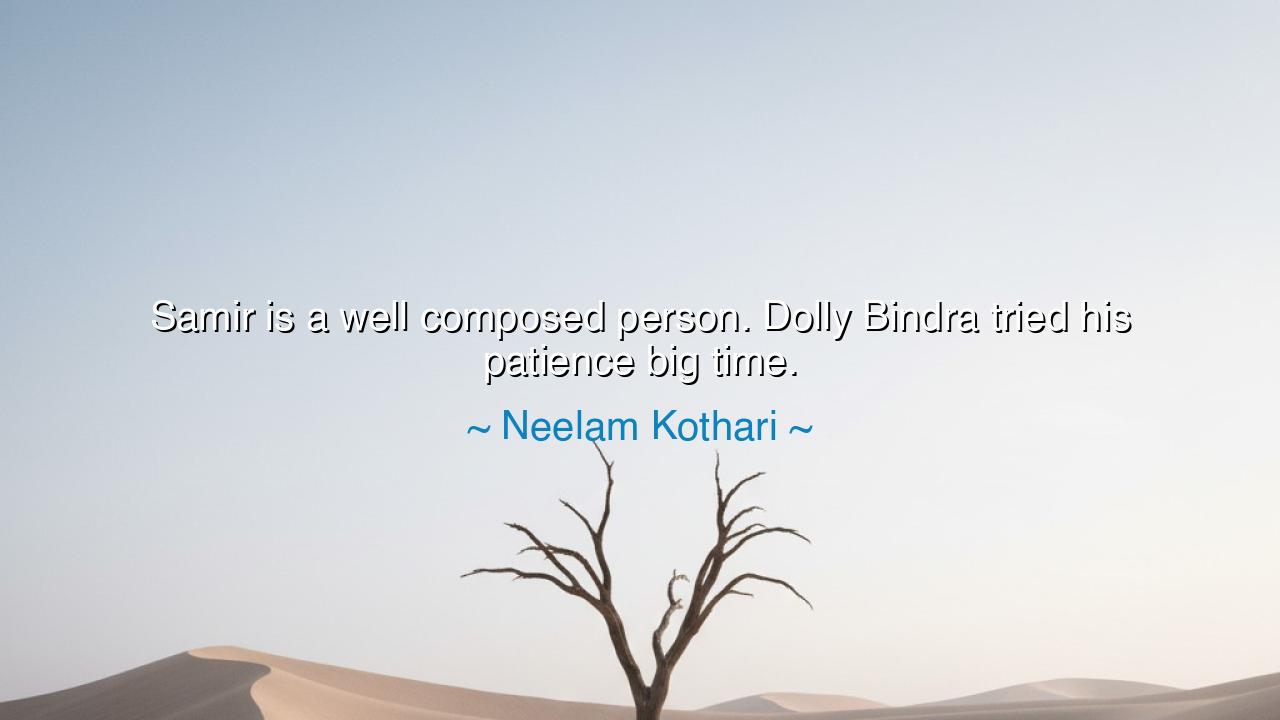
Samir is a well composed person. Dolly Bindra tried his patience






Hear the words of Neelam Kothari, who bore witness to the strength of composure: “Samir is a well composed person. Dolly Bindra tried his patience big time.” Though spoken of individuals in a moment of conflict, these words rise above their circumstance and reveal an eternal truth—that the greatness of a man is not shown when all is calm, but when the storm rages and he remains unmoved.
She begins with the praise: “Samir is a well composed person.” To be composed is no small virtue. It is the ability to master the tempest within, to govern the emotions when provoked, to stand firm like a mountain even as winds howl. Composure is not the absence of feeling, but the strength to rule one’s own passions, so that anger does not dictate action, nor pride command words. In this, Samir becomes an example of what the ancients called self-mastery—the highest form of victory.
Yet Kothari reveals that his composure was tested: “Dolly Bindra tried his patience big time.” Here lies the second truth. Patience is not proven when life is easy; it is proven when another strikes against it with persistence, when insults are sharp, when conflict is unyielding. Just as gold is tested in fire, so is patience tested in strife. Dolly Bindra becomes in this story the fire, the adversary, the instrument through which Samir’s inner strength was revealed. Without the trial, his composure would have been unseen.
History offers us many mirrors of this lesson. Recall Socrates, standing in the courts of Athens, mocked, accused, condemned. His enemies sought to provoke him, to shatter his spirit. Yet he remained calm, composed, patient even in the face of death. His refusal to be moved by anger became his eternal glory, greater than any victory in debate. Like Samir, his patience was tested “big time”—and in that test, his greatness shone.
We see the same in the life of Mahatma Gandhi. Faced with oppression, insults, and violence, he did not erupt in wrath, but endured with patience. His composure before his enemies turned weakness into strength, and transformed the struggle for independence into a movement of moral power. His life teaches the same truth that Neelam saw in Samir: patience is not passivity, but strength under pressure, the ability to endure the provocations of others without surrendering to rage.
From this tale we learn that true patience is forged in trial. To be calm when untested is easy; to be calm when provoked is divine. Those who would lead, those who would endure, must cultivate composure not as a mask, but as a discipline, rooted in humility and inner strength. For there will always be a “Dolly Bindra” in life—those who test, who provoke, who challenge. The question is not whether they will come, but whether we will master ourselves when they do.
The lesson is clear: guard your composure, and train your patience. Do not let anger rule you, for he who is ruled by anger is already defeated. Practical actions follow: when provoked, pause before you answer. When tested, breathe and hold your ground. Recognize that every trial of patience is an opportunity to reveal your strength. And remember always: it is not the provoker who defines you, but the way you respond.
Thus, Neelam Kothari’s words, though spoken of Samir, shine as guidance for all. To be well composed in the face of provocation is to stand as a pillar of strength, unmoved by the winds of conflict. And to endure the testing of one’s patience is to claim a victory greater than any quarrel—for it is the victory of the self over the self, the triumph of spirit over storm.






AAdministratorAdministrator
Welcome, honored guests. Please leave a comment, we will respond soon